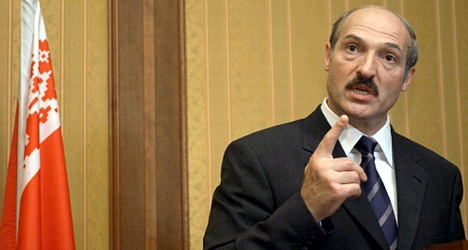
Russia Turns on Lukashenka
Publication: Eurasia Daily Monitor Volume: 7 Issue: 133
By:

On July 5 at the Eurasian Economic Community’s Interstate Council in Astana, Belarus, Russia, and Kazakhstan agreed to form a Customs Union that came into effect the next day. Kyrgyzstan and Tajikistan may join at some point in the future. The Union between Russia and Kazakhstan was formalized on July 1, but Belarus delayed signing the documents (Interfax, July 5). Kazakhstan and Belarus want a Common Economic Space to be in place by January 1, 2012 (ITAR-TASS, July 5).
The ratification of the Union took place against the background of a new “gas war” between Russia and Belarus, which was resolved when Belarus met a reported backlog of payments by taking out a loan from Azerbaijan, and Russia agreed to settle a deficit for transit fees. The amounts allegedly owed on both sides were quite similar ($228 million owed for transit fees by Russia; $192 million for imported gas by Belarus) (EDM, Jun 25), giving rise to comments by Belarusian President, Alyaksandr Lukashenka, that Russia could “lose” Belarus if it “continues to act in such a fashion” (Belarusian Telegraph Agency, June 29).
The points of contention have embraced a variety of issues over the past year: a Russian ban on Belarusian dairy products in June 2009; Belarus’ continuing its refusal to recognize the independence of South Ossetia and Abkhazia in support of Russia’s lead; a general reluctance by Belarus to take up its role as rotating chair of the Collective Security Treaty Organization (CSTO) last year; Lukashenka’s decision to offer refuge to the deposed Kyrgyz president, Kurmanbek Bakiyev, embarrassing Moscow, which had colluded in his removal (EDM, May 10); and Russia’s imposition of customs fees for oil exports to Belarus, which the Belarusian government regards as unfair (RIA Novosti, March 30). The latter two questions remain unresolved.
On July 4, the day before the Astana summit, the Russian television station NTV, in its “Emergency Situations” segment, ran a critical documentary about Lukashenka entitled Krestnyi bat’ka (The Godfather). The film discussed in detail the kidnappings and disappearance of several prominent Belarusian statespersons in the late 1990’s (former Interior Minister ,Yury Zakharanka, former head of the Central Election Commission, Viktar Hanchar, journalist, Zmitser Zavadski, and businessman, Anatol Krasouski, as well as the mysterious death of the Deputy Speaker of Parliament, Henadz Karpenka) stating clearly that the Belarusian leader was responsible for their elimination. It also included a clipping of Lukashenka praising Hitler and the German state structure of the 1930’s as an ideal model, a comment he reportedly made in 1995 to a German newspaper (www.charter97.org, July 4).
The film also looked at Lukashenka’s private life with his “love child” son Kolya, and maintained that he had regularly sabotaged the Russia-Belarus Union, refused to pay for gas, and had not recognized the two Georgian breakaway republics (www.korrespondent.net, July 5). Undoubtedly, such a sensational film could only have been shown with the assent of the Russian government. It followed Russian President, Dmitry Medvedev’s, denunciation of a letter from Lukashenka to 80 Russian businessmen outlining the Belarusian position on the Customs Union and gas crisis, which was dismissed as “spam” (Nasha Niva, July 3).
Subsequently, Lukashenka retorted that Medvedev needed to calm down and look at the real world. In his view, Belarus has ratified promptly all the treaties and agreements relating to the Customs Union. Moreover, Belarus never tried to censor comments by Medvedev and thus there was no reason for the Russian government to attack him for commenting in the Russian press. Lukashenka’s letter to the businessmen evidently had the same text as his letter in Pravda on June 28, which denounced Russia’s actions as imperiling the integration of the two states.
The nature of the conflict was the subject of a recent analysis by Valery Karbalevich, a political analyst with the independent Minsk-based Strategy Center for Political Analysis, who perceives Lukashenka’s goals as follows: to obtain continuing economic and political backing from Russia for the preservation of the Belarusian social model, while maintaining undivided authority over Belarus. Russia, on the other hand, wants an obedient satellite, and control over the Belarusian economy. As a result, the two sides have developed the practice of trading insults, which has become part of an accepted ritual (Narodnaya Volya, July 1).
In contrast to earlier differences, however, the recent disputes have spread to the military-political arena and after recent events, Moscow’s patience has expired and “there are no worse devils than fallen angels.” However, Russia supports the notion of a union state less for formal than political and psychological reasons –the “loss” of Belarus would be a national trauma for the society and ruling class in Russia. Belarus, on the other hand, has only survived hitherto by living off foreign credits, which puts its future existence in some danger (Narodnaya Volya, July 1).
Meanwhile, opposition leaders, such as Paval Sevyarinets of the Belarusian Christian Democratic Party, perceive the Customs Union as a flawed step that will bring few benefits and undermine efforts to move closer to the EU (www.telegraf.by, July 5). Lukashenka may disagree, but whatever benefits may accrue from the Customs Union, his leadership has lost the support of Moscow. The kidnappings and murders of the late 1990’s came at a time when Lukashenka’s term of office had officially expired. They are the most sensitive issue for the president and while the irony of Russian leaders as moral exemplars will not be lost on him, nor will the fact that his former allies in Moscow chose to run a film branding him as a tyrant and murderer.




